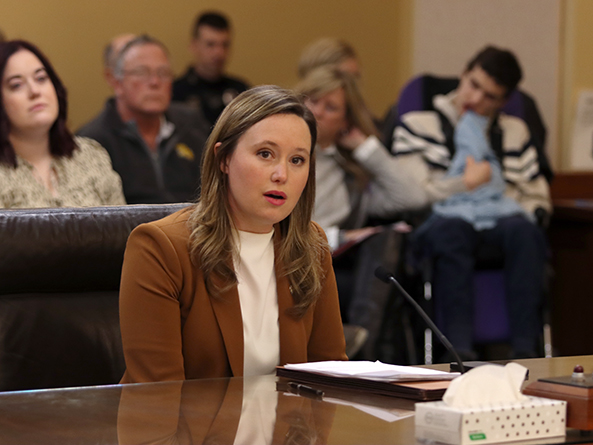Medical cannabis legalization proposed
A bill that would legalize certain forms of cannabis for medical use was considered by the Judiciary Committee Feb. 9.

LB588, introduced by Lincoln Sen. Anna Wishart, would create a framework for legalizing medical cannabis in Nebraska. To qualify for the medical cannabis registry program under the bill, a patient with a qualifying medical condition must receive written consent from a health care practitioner indicating that cannabis would improve their condition.
In 2020 and 2022, Wishart led two initiative petition drives — that combined obtained nearly 400,000 signatures — that would have put medical cannabis on the November ballot for each corresponding year. Both initiatives failed after facing legal and financial challenges.
Wishart said that despite those challenges, it is clear that medical cannabis is an issue that matters to Nebraskans. Research shows that cannabis is effective for the treatment of several chronic illnesses, she said, including epilepsy, post-traumatic stress disorder and traumatic brain injuries. In addition, she said, LB588 would be one of the most conservative medical cannabis laws in the country.
“Compared to many prescription drugs, including opioid pain medications — which is one of the leading causes of death in the United States — medical cannabis is far safer and far less addictive,” Wishart said. “No family should have to flee [the state] to get access to medical cannabis for themselves or a loved one.”
Under the bill, a cannabis dispensary would be required to hire a pharmacist to advise and educate patients about dosage and usage in person or by telemedicine. Registered medical cannabis users would be allowed up to 2.5 ounces of cannabis — unless otherwise directed by a health care provider — or cannabis infused products with no more than 2,000 milligrams of THC.
Vaporization and smoking of medical cannabis would not be allowed under the bill. Edibles — other than a pill — also would not be allowed. The bill would prohibit an individual from using cannabis while operating a motor vehicle, aircraft, train or motorboat, or working on a transportation property, equipment or facility while under the influence of cannabis.
Finally, LB588 would create the Medical Cannabis Board and a Cannabis Enforcement Department to oversee the bill’s implementation.
Amanda McKinney, a physician and educator who specializes in medical cannabis, spoke in favor of LB588. Medical cannabis is safe, she said, especially in comparison to modern Western medicine.
“There have never been any reported overdose deaths from cannabis use, while there are over 10,000 deaths annually from 17 FDA-approved drugs that are often used when cannabis could be used instead,” McKinney said.
Amy Marasco, representing Americans for Safe Access, also spoke in support.
Currently, there are over 6 million legal medical cannabis patients across the country, she said, but Nebraska is one of only two states that does not provide any access to medical cannabis.
“These patients are not nameless, faceless people — they are our parents, grandparents, children, colleagues and our revered veterans,” Marasco said. “They deserve the same access to medical cannabis options as patients have in the states that surround Nebraska.”
Heather Bernard, executive director of Epilepsy Foundation Nebraska, testified in support of the proposal. There are roughly 19,600 people with epilepsy and seizure disorder in Nebraska, she said, and it is the 4th most common neurological disorder in the U.S.
Currently, use of medical cannabis is legal under state law in a majority of states, Bernard said, and a number of people living with epilepsy in those states report beneficial effects, including a decrease in seizure activity, when using cannabis.
Testifying in opposition to the bill was Nebraska Attorney General Mike Hilgers. When state law conflicts with federal law, the state law is voided under the Supremacy Clause of the U.S. Constitution, he said. Congress has classified marijuana as a Schedule I drug, Hilgers said, meaning it cannot be sold or used for any purpose — therefore, the sale and distribution of marijuana, even for medicinal purposes, is unconstitutional.
Col. John Bolduc, superintendent of the Nebraska State Patrol, also spoke in opposition to LB588. He said a recent study found that three-fourths of legally produced marijuana was diverted to the black market, and that legalizing medical marijuana in Nebraska would burden the state patrol’s crime lab.
“Because of the demand and potential profit, decriminalizing the possession and distribution of medical marijuana contributes to the dangerous problem the black market poses to public safety,” Bolduc said.
Roger Donovick, chief medical officer with the state Department of Health and Human Services, testified against the proposal. Legalizing marijuana for any purpose, including medicinal use, poses risks to the health and safety of Nebraska residents, he said.
“Substances in Schedule I are listed as highly addictive and have no currently accepted medical uses,” Donovick said.
John Massey testified in a neutral capacity on behalf of the Nebraska Medical Association. In past years, the NMA was in opposition to similar legislation, he said, but LB588 addresses earlier concerns by including a list of qualifying medical conditions.
Massey added that although medical cannabis may be effective in a narrow set of circumstances and for certain diseases, more research is needed on its therapeutic effects.
The committee took no immediate action on the proposal.


